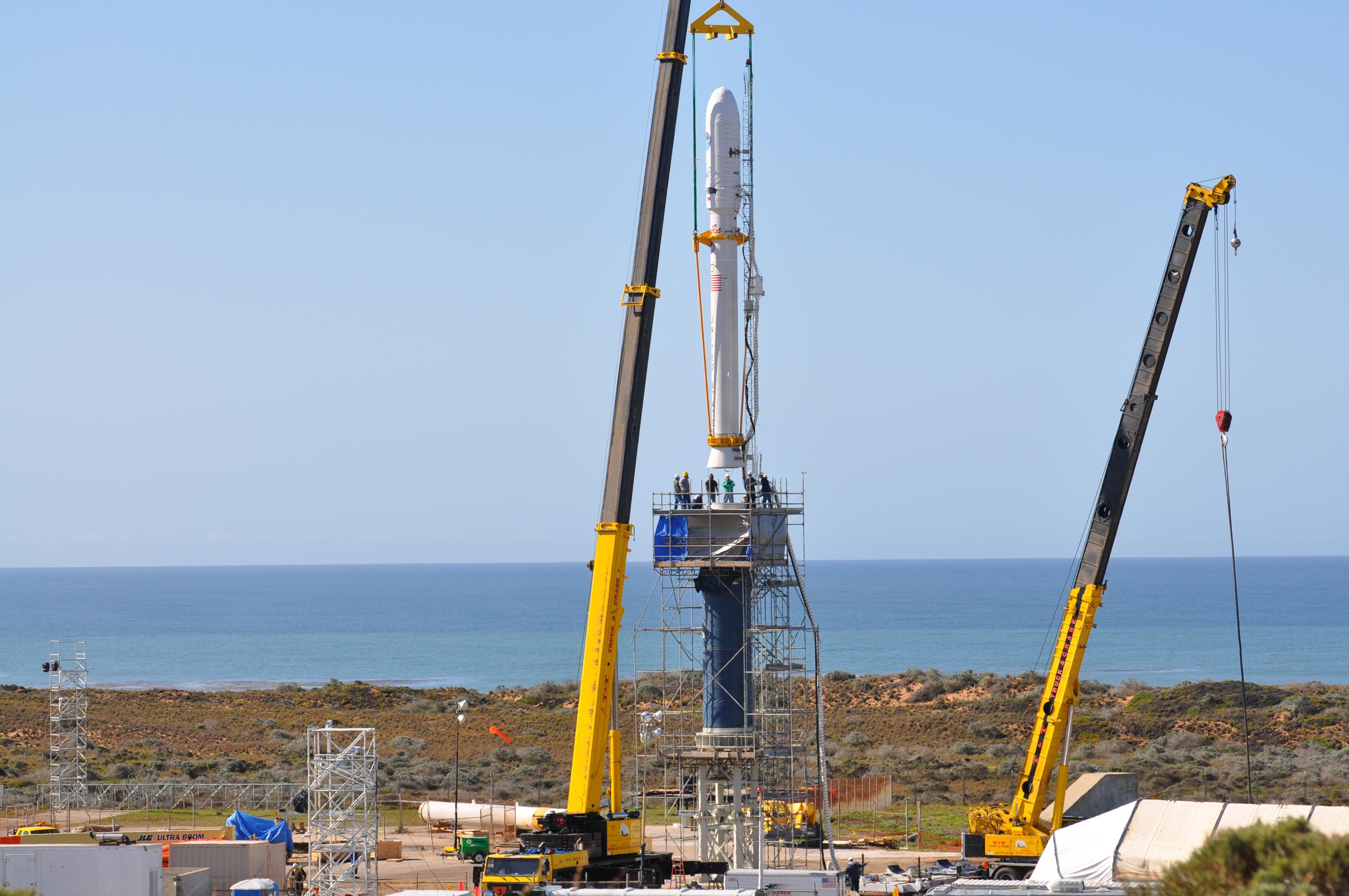May 10, 2011 Vol. 4, Issue 3
Master practitioners shared their stories and lessons learned from their work on the Space Shuttle, International Space Station, and Constellation programs at Masters Forum 20.
“Learning from the past and preparing for the future—it’s the key to being successful,” said Bob Cabana, director of Kennedy Space Center (KSC) and a former astronaut, at the start of the NASA Academy of Program/Project & Engineering Leadership’s third Masters Forum dedicated to the retirement of the Space Shuttle Program. Looking to the future of human space exploration, he said, “We have to build a sustainable system that’s ‘evolvable.’”
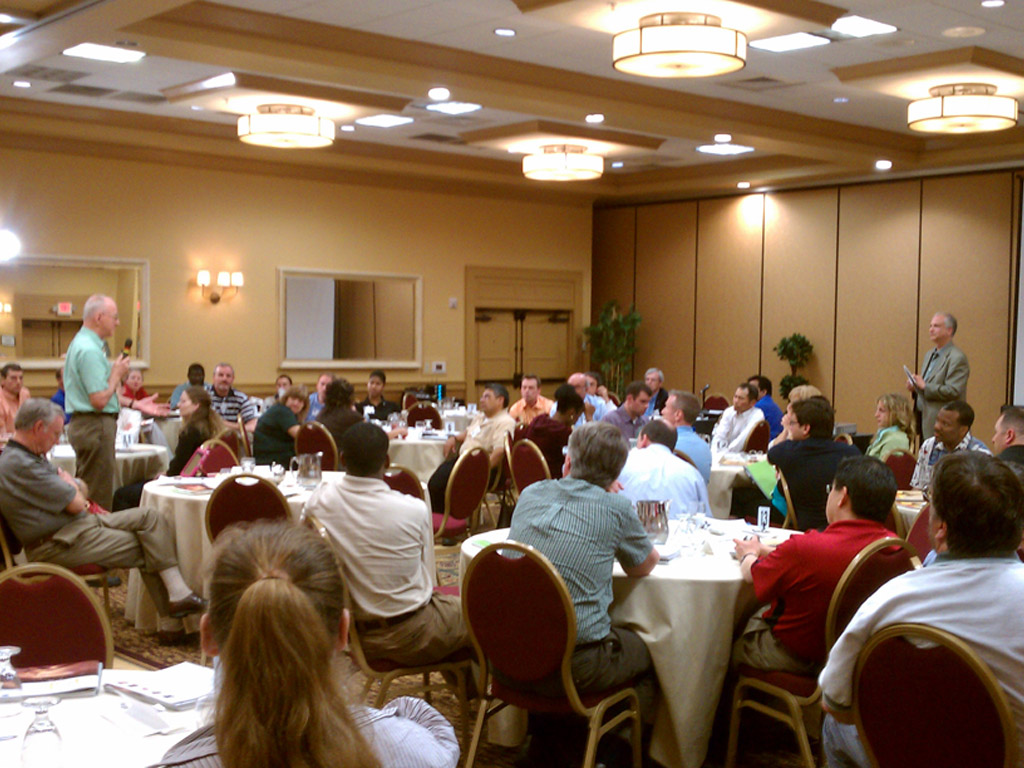
Russel Rhodes, former NASA systems engineer and manager, asks a question of Ed Hoffman, director of the NASA Academy, at Masters Forum 20 in Melbourne, FL. Credit: NASA APPEL
“We are here to work together and learn together,” explained Academy director Dr. Ed Hoffman. Citing a recent Masters with Masters event
with Mars mission veteran Rob Manning, Hoffman recalled a favorite quote: “What I learned is that we sometimes just have to stop and think.”
The first panel on the formulation, development, and operations of the Shuttle Program included Jody Singer, deputy project manager for the Shuttle Propulsion Office and deputy manager for the Ares Project Office at Marshall Space Flight Center (MSFC); Russel Rhodes, former NASA systems engineer and manager; Frank Buzzard, former program manager of the International Space Station (ISS), Tommy Holloway, former manager of the International Space Station Program; and Tom Moser, former Orbiter deputy project manager and director of engineering at Johnson Space Center (JSC). “We probably have 200 years of experience amongst us,” said Moser. From Apollo to shuttle there was a “conservation of complexity,” he explained, but also several new lessons, including the importance of “political systems engineering,” which has continued to increase ever since the start of the program. “Deal with it,” he said. “It’s there. It’s real.” (Read more about Tom Moser in From Sketch Pad to Launchpad.)
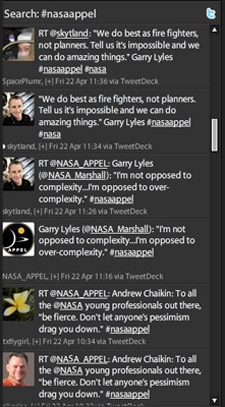
Attendees at the Academy’s Masters Forum 20 tweeted during the event to capture and share key insights from the event. Credit: NASA APPEL
From Singer’s perspective, defining requirements is critical. “Define the baseline,” she said. “Don’t keep redesigning it as you go along.” Continuous learning and hands-on experiences contribute to a larger understanding of why things are done a certain way. “You understand why you’re changing something and the importance of it,” she added.
Rhodes called for greater cost control processes to address affordability, similar to the control processes for mass limitations. Reusable systems are a must for future sustainability. “You either pay me now or pay me later,” he said.
“Stand on the shoulders of giants,” said Buzzard. “Learn from what they did and extend the successes they had.” Buzzard identified a division of labor based on core competencies, genuine relationships, openness to other ideas, leading by example, and effective communications as key to mission success.
“[Shuttle is] the beginning that gave people the first step into the future,” said Holloway. He encouraged the audience to be ready for what comes next. “You never know when you’re going to be put into the gap to fill the breach,” he said, “to be the one individual that makes a difference.”
Joe Rothenberg, former operations manager for the Hubble Space Telescope (HST), spoke about how HST’s jitter and spherical aberration taught him to develop a “conscious expectation of the unexpected.” He was thankful for the opportunity he had to work on the program and grow as a manager. “If you’re ever asked to take on the number one priority in your organizations, do it,” he said.
The forum also featured presentations on space exploration life sciences. Howard Ross, chief technologist at Glenn Research Center, shared stories of several science experiments that have flown on the shuttle and International Space Station, including the Shuttle Radar Topography Mission (STRM), liquid behaviors in space, tissue engineering, and materials experiments. Scott Smith, who leads the Nutritional Biochemistry Laboratory at Johnson Space Center (JSC), shared partial findings related to a newly completed study due to be published in the near future. He also provided some perspective on the importance of the nutrition field in space exploration. “We know more about nutrition from exploration missions than from anything else,” he said, citing the problem that scurvy posed for sailors in the past. As it is unlikely there will be food on other planets, “we need to make sure that we understand the nutrient requirements,” he said.
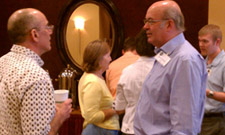
Attendees at the NASA APPEL Masters Forum engage in discussion during a coffee break. Credit: NASA APPEL
International guests Lionel Baize, project manager for CNES’s ATV Control Center, shared lessons learned from European ISS operations; Rupert Gerzer, head of the DLR Institute of Aerospace Medicine for the German Aerospace Agency (DLR), reflected on Spacelab and shared current biomedical experiment findings; Shinobu Doi, project manager and flight director at the Japanese Aerospace Exploration Agency (JAXA), discussed Japan’s contributions to the ISS, including JEM and KIBO; and Sreedhara Panicker Somanath from the Indian Space Research Organization (ISRO) provided an overview about upcoming international cooperation and common organizational issues relating to workforce retirement and the need to develop the next generation.
Phil Sumrall, advanced planning manager of the Ares Projects Office at Marshall Space Flight Center, and Cleon Lacefield, vice president and Orion Crew Exploration Vehicle Program manager at Lockheed Martin, hosted a panel on lessons learned from the Constellation Program. Both emphasized the importance of planning and adaptability in the face of a dynamic environment.
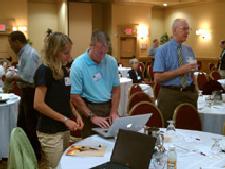
The NASA APPEL Masters Forum 20 brought together members from all generations to share stories and knowledge in Melbourne, FL. Credit: NASA APPEL
John Olson, director of the Directorate Integration Office for the Exploration Systems Mission Directorate, Garry Lyles, associate director for technical management in the Engineering Directorate at MSFC, and Maria Collura, acting deputy director of the Space Transportation Planning Office at KSC, discussed current projects and capabilities shaping the future of NASA, including the Space Launch System, Multi-Purpose Crew Vehicle, Robonaut-2, human research, and the recent Commercial Crew Development (CCDEV) awards. Olson emphasized the importance of rewarding value-conscience performance, developing and sharing best practices, and building cross-organizational partnerships. “We are absolutely looking forward to a robust future,” said Olson.
Hedden announced the initiation of a 20-year longitudinal study tracking industry young professionals. She looks forward to future research that will provide more international perspectives and insights about what information young professionals find is best transferred through specific media channels.
Additional speakers included astronaut Ken Cameron, on the second shuttle-Mir mission, STS-134; Julie Robinson, program scientist for the ISS, who discussed ISS research including bacterial virulence and candidate vaccines and cancer treatments; seven panelists on the Young Professionals Panel (see
Stories from the Next Generation);
Michael Bell, program manager for NASA’s Lessons Learned Program, in the NASA Engineering Network (NEN); Ed Rogers, chief knowledge officer at GSFC, on case studies; and Matthew Kohut, communications lead for the NASA Academy.
The two-and-a-half-day forum included a tour of Kennedy Space Center and participatory knowledge capture sessions. ”Learning is a career function,” said Holloway, “a continuous process for as long as you can breathe.”
Learn more about the Academy’s Masters Forums.







